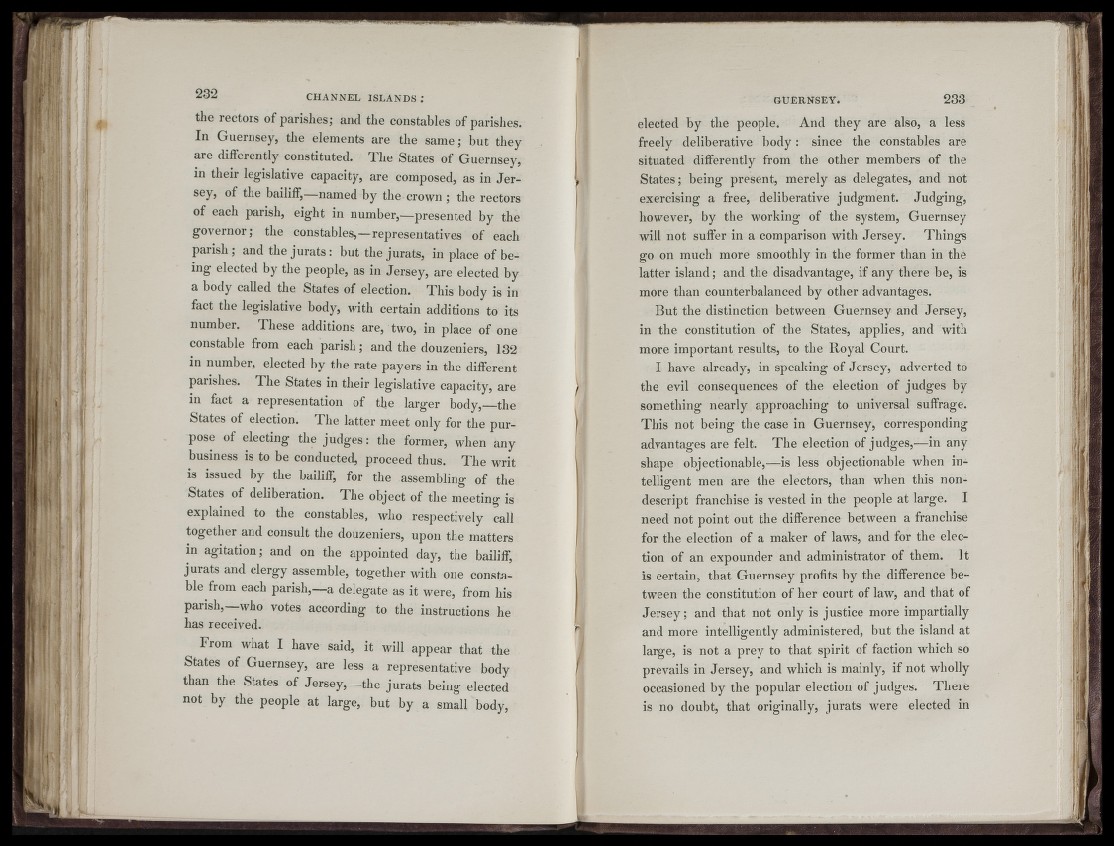
- - î '
I
•Int
I11"1 I ri!.' 1fi 1! H ■ 4^/
fî3
1Ï
I I F * “i
h 1
I
F
1 1 ;
i
■ ;'i ■
¥ , i
• j
1 i 1!
J
<• ] 1
1 1
• E li ' I
Mi i t
i f . ■!
s *-
I , '
il) -
J
U
I I :
I I
23*2 CHANNEL ISLANDS ;
the rectors of parishes; and the constables of parishes.
In Guernsey, the elements are the same; but they
are differently constituted. The States of Guernsey,
in their legislative capacity, are composed, as in Jersey,
of the bailiff,—named by the crown ; the rectors
of each parish, eight in number,—presented by the
governor; the constables,—representatives of each
parish; and the jurats : but the jurats, in place of being
elected by the people, as in Jersey, are elected by
a body called the States of election. This body is in
fact the legislative body, with certain additions to its
number. These additions are, two, in place of one
constable from each parish ; and the douzeniers, 132
in number, elected by the rate payers in the different
parishes. The States in their legislative capacity, are
in fact a representation of the larger body,—the
States of election. The latter meet only for the purpose
of electing the judges: the former, when any
business is to be conducted, proceed thus. The writ
is issued by the bailiff, for the assembling of the
States of deliberation. The object of the meeting is
explained to the constables, who respectively call
together and consult the douzeniers, upon the matters
in agitation; and on the appointed day, the bailiff,
jurats and clergy assemble, together with one constable
from each parish,—a delegate as it were, from his
parish,—who votes according to the instructions he
has received.
From what I have said, it will appear that the
States of Guernsey, are less a representative body
than the States of Jersey,—the jurats being elected
not by the people at large, but by a small body,
GUERNSEY. 233
elected by the people. And they are also, a less
freely deliberative b o d y : since the constables are
situated differently from the other members of the
States; being present, merely as delegates, and not
exercising a free, deliberative judgment. Judging,
however, by the working of the system, Guernsey
will not suffer in a comparison with Jersey. Things
go on much more smoothly in the former than in the
latter island; and the disadvantage, if any there be, is
more than counterbalanced by other advantages.
But the distinction between Guernsey and Jersey,
in the constitution of the States, applies, and with
more important results, to the Royal Court.
I have already, in speaking of Jersey, adverted to
the evil consequences of the election of judges by
something nearly approaching to universal suffrage.
This not being tbe case in Guernsey, corresponding
advantages are felt. The election of judges,—in any
shape objectionable,—is less objectionable when intelligent
men are the electors, than when this nondescript
franchise is vested in the people at large. I
need not point out the difference between a franchise
for the election of a maker of laws, and for the election
of an expounder and administrator of them. It
is certain, that Guernsey profits by the difference be-
tw*een the constitution of her court of law, and that of
Jersey; and that not only is justice more impartially
and more intelligently administered, but the island at
large, is not a prey to that spirit of faction which so
prevails in Jersey, and which is mainly, if not wholly
occasioned by the popular election of judges. There
is no doubt, that originally, jurats were elected in
II
I
El
id
iij